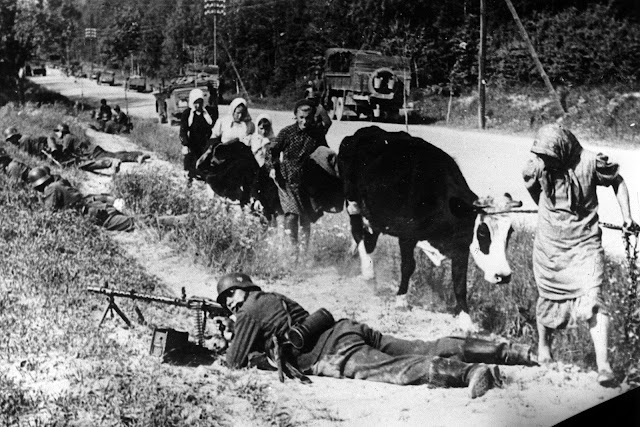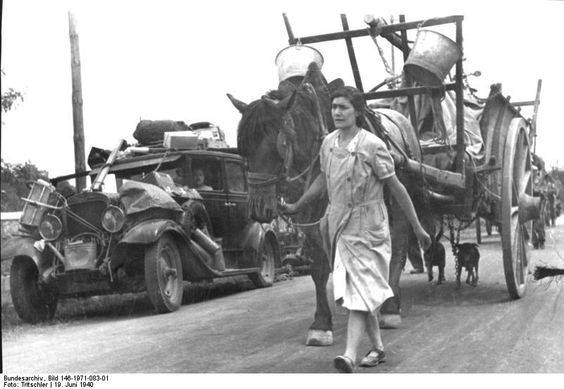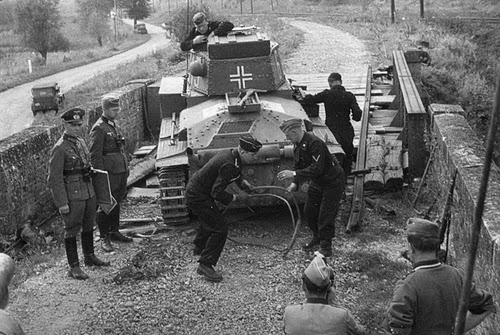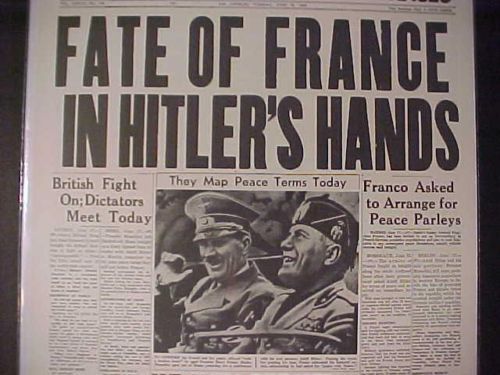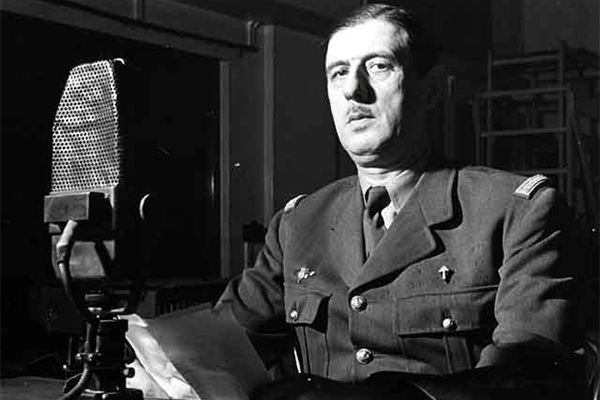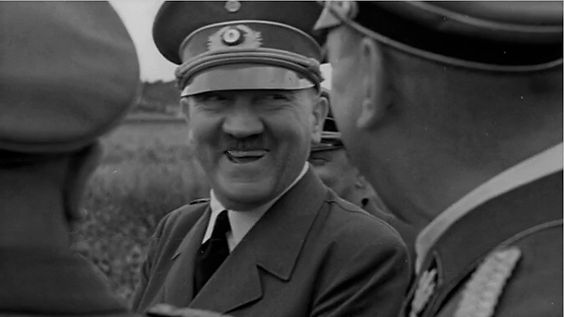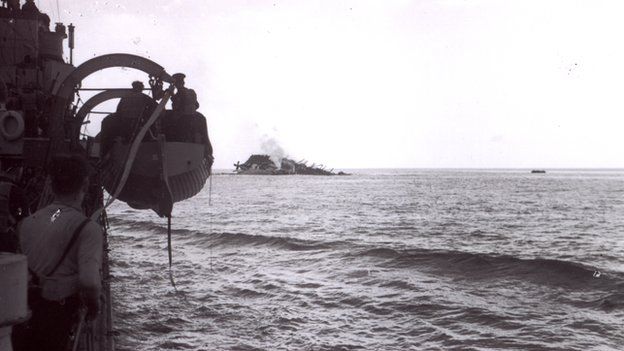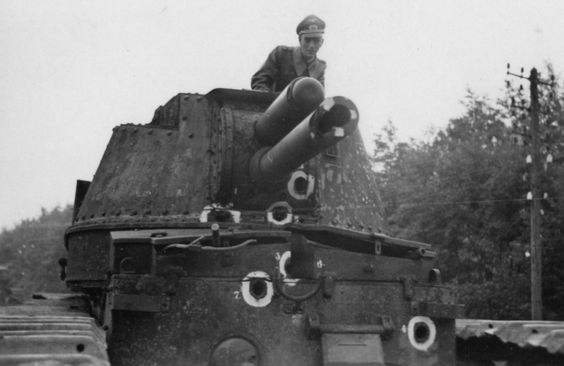Sunday 6 July 1941
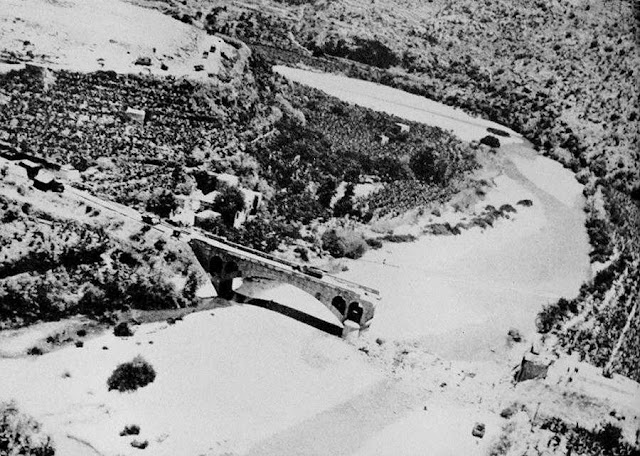 |
| A destroyed bridge at the mouth of the Damour River, Lebanon, 1941. |
In the Far North sector, the German advance toward Murmansk makes some progress across the Litsa River. However, Soviet defenses are firming as reinforcements arrive.
Further south, the Axis Operation Arctic Fox Operation resumes. The German XXXVI Corps has called up infantry from southern Finland and asked the Finnish 6th Division to disrupt the Soviet defenses at Salla. This does the trick and the Soviet 14th Army (122nd Rifle Division, the 104th Rifle Division, and the 1st Tank Division) is forced to retreat back into Salla itself. The Germans actually break into Salla briefly, but the Soviets quickly push them out again. As elsewhere on the Eastern Front, the Luftwaffe plays a key role in the Heer's success, with Luftflotte 5 helping to break up the Soviet concentrations. This, of course, is the old Blitzkrieg formula.
What this incident at Salla illustrates above all is that the Soviet strength lies in direct confrontations, while German strength lies in tactics and maneuverability and airpower. These are lessons the German leadership sometimes has a hard time remembering but when applied, lead to the Reich's greatest successes in the USSR.
In the Army Grup North sector, the motorized units establish a line from Lake Peipus to Reval to Parun. The Soviets counterattack and make some gains.
In the Army Group Center sector, the Soviet 7th and 5th Mechanized Corps of the Soviet 20th Army (Lieutenant-General P.A. Kurochkin) attack with about 700-1,500 tanks near Lepel. While this is an impressive number of vehicles, only a small fraction are types that give the German panzers trouble. The Germans of General Hoth's 3rd Panzer Group are prepared - Hitler has reined the panzers in recently - and the Soviet armored vehicles are mauled. German 7th Panzer Division - Erwin Rommel's old formation - illustrates the power of the defensive and virtually wipes out the two Soviet formations. This is known as the First Battle of Smolensk.
In the Army Group South sector, the Germans attack in the north with 1st Panzer Group and Sixth Army and in the south with the German 17th Army and Romanian 3rd Army. The northern prong of the advance approaches Zhytomyr, while the southern prong takes Khotyn Fortress on the Dniestr River.
Despite occasional Red Air Force successes, overall the Luftwaffe dominates the skies. Today, for instance, JG 54 intercepts a formation of 73 Soviet bombers attacking the German bridgehead at Ostrov. The Luftwaffe pilots claim 65 Soviet bombers shot down, and ace Max-Hellmuth Ostermann claims his 19th and 20th victories.
This German superiority in the air has led to frustration on the Soviet side. Some Soviet pilots resort to ramming Luftwaffe planes. Amazingly, some Soviet pilots not only survive the dangerous encounters but manage to return to base. However, the Luftwaffe remains much stronger than the Red Air Force despite steady losses.
As it has for several days now, the Royal Navy parks a large force led by light cruisers Ajax and Perth off Damour. The ships bombard Vichy French positions in aid of the Australian attack.
Australian Lieutenant Roden Cutler receives the Victoria Cross for heroism for actions today. He clears some enemy positions, then, wounded, is forced to lie in the open for 26 hours before being rescued. Cutler loses his leg due to the ordeal.
European Air Operations: RAF Bomber Command attacks Brest during the night with 109 bombers. RAF Fighter Command sends a Circus mission over Lille.
RAF ace Douglas Bader shoots down a Bf 109
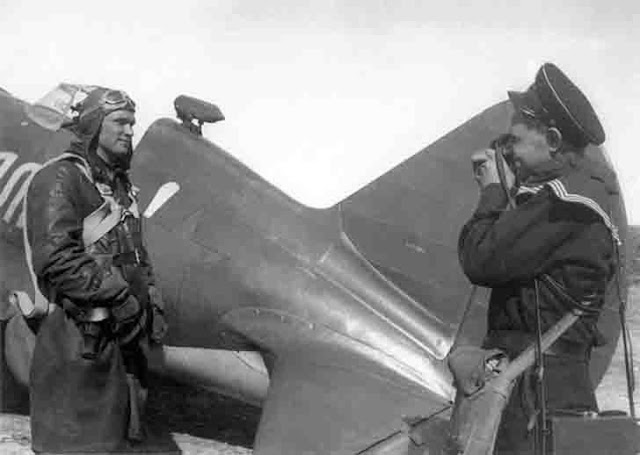 |
| Soviet pilots Boris Safonov and Evgeny Khaldey of the 72nd CAP (mixed aviation regiment) of the Northern Fleet Air Force. They are with an I-16 Type 24 fighter at Vaenga airfield, July 6, 1941. |
Battle of the Baltic: Soviet minesweeper T-216 sinks off Saaremaa, Estonia. The cause is uncertain, perhaps by a mine.
Latvian freighter Everolanda hits a mine and sinks.
Finnish warships Syosky, Vinha, and Raju sink a Soviet fishing boat. Not much is known about this incident.
 |
| This Bristol Blenheim of No. 21 Squadron, Z7432/YH:J, lost hydraulic pressure and crashed on 6 July 1941 near Watton. |
The Luftwaffe bombs and damages 1363-ton Swedish freighter Birgitta in the North Sea. It is towed to Great Yarmouth.
The Luftwaffe bombs and damages 3658-ton freighter North Devon off Sheringham. There are five deaths. The North Devon is towed to Immingham. One of the deaths is Reginald Hamilton Earnshaw. Earnshaw, 14, is officially declared the youngest known British service casualty of WWII by the Commonwealth War Graves Commission on February 5, 2010, which would have been his 83rd birthday. Earnshaw served as a cabin boy and lied about his age to get hired.
German raiders Atlantis and Orion have been meeting north of the island of Tristan da Cunha in the South Atlantic. Today, Atlantis heads east to the South Pacific while the Orion heads west toward South America.
Convoy OB-343 departs from Liverpool, Convoy HX-137 departs from Halifax.
Canadian destroyer HMCS Hamilton is commissioned, minesweeper Melville is launched.
 |
| The Bremen Rathaus (Town Hall), 6 July 1941 (Proietti, Ugo, Federal Archives, Bild 212-219). |
At Malta, Italian bombers attack the Paola dockyards. It is a heavy raid lasting for four hours and killing 15 and wounding 14 people. There also are scattered raids on Marsa and other locations.
Ecuador/Peru Border War: The long-festering grievances about the border led to the outbreak of hostilities on the 5th, and today things get hotter. While exactly how the war started is hotly disputed, there is no question that Peru quickly gains the upper hand. While a small party of Ecuadorian soldiers crossed the border on the first day of the war, today the Peruvian soldiers eject them and turn the tables. Peruvian paratroopers take Matapalo Island, which Ecuador seized in 1938. The Peruvian air force is active, attacking Ecuadorian border posts along the Zarumilla River. Meanwhile, mediators from neighboring Brazil and Argentina, along with US representatives, quickly try to broker a settlement.
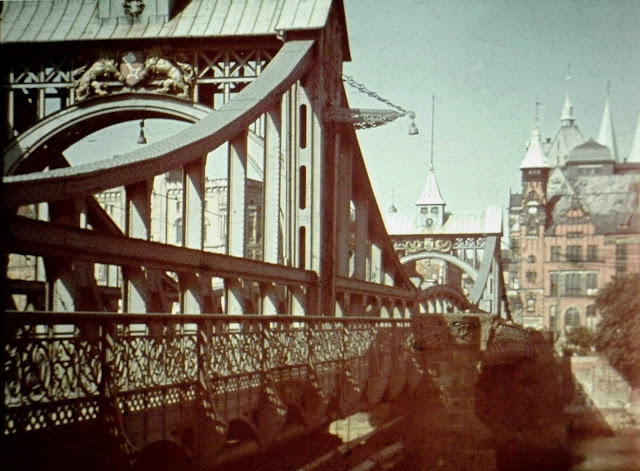 |
| The Lüderitz Bridge aka Great Weser Bridge (Große Weserbrücke) over the Weser, 6 July 1941 ( Proietti, Ugo, Federal Archives, Bild 212-215). |
Should Japan enter upon a course of military aggression and conquest it stands to reason that such action would render illusory the cherished hope of the American Government, which it understood was shared by the Japanese Government, that peace in the Pacific area, far from being further upset, might now indeed be strengthened and made more secure. It is the earnest hope of the Government of the United States that the reports of Japan's decision to enter upon hostilities against the Soviet Union are not based upon fact, and an assurance to that effect from His Excellency the Prime Minister of Japan would be deeply appreciated by the Government of the United States.In fact, the Japanese have decided not to attack the Soviet Union. Unknown to the Americans, they have other targets in mind.
Anglo/US Relations: President Roosevelt cables British Prime Minister Winston Churchill with "will advise you" on Churchill's request that the US and Great Britain form a joint committee on tank development. Churchill is concerned about German tank superiority and realizes that larger and more powerful tanks are required, but the US at this time does not have any heavy tanks in its arsenal.
Anglo/Soviet Relations: British Prime Minister sends a message to Soviet Premier Joseph Stalin expressing a hope that they can cooperate in the fight against Germany. Unlike US President Roosevelt, Stalin is not particularly chatty with cables and does not typically respond quickly.
Italian/Japanese Relations: Japan takes over the protection of Italy's Embassy in Moscow.
Holocaust: The occupying German authorities in Kaunas/Kovno, Lithuania institute a pogrom that ultimately claims thousands of lives. The killings by Einsatzgruppen occur at the Seventh Fort, where Jewish residents have been imprisoned.
"Die Tat," a Swiss newspaper, reports on a Soviet massacre of innocent prisoners at Lemberg. It states that:
this massacre is one of the most dreadful and ruthless massacres ever heard of in the history of the world. In the police prison 20 prisoners were crowded together in each of the smallest cells; they were then shot through the spy-holes. 2,000 to 2,500 persons were murdered in this way.The Germans already know about this incident. They have forced Jewish residents of Lemberg to dig up the corpses from a prison yard and rebury them elsewhere. This incident becomes controversial because of post-war Soviet claims that the Lemberg massacre was carried out by the Ukrainian "Nightingale" Legion, a special formation organized by the Wehrmacht.
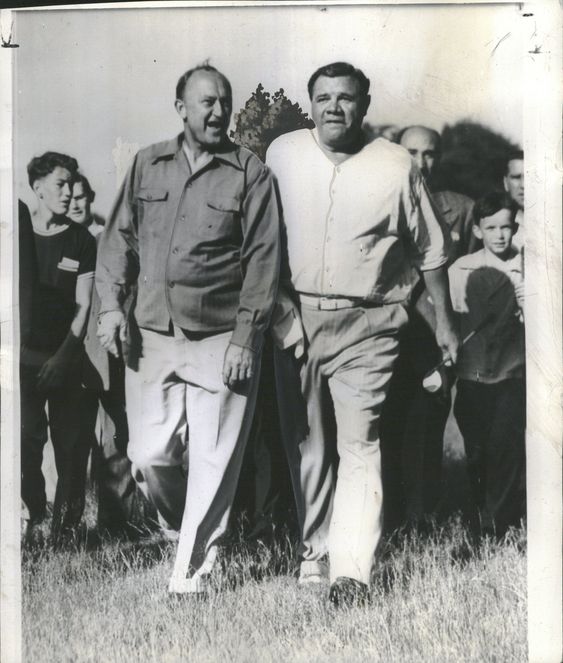 |
| Babe Ruth and Ty Cobb at a charity tournament in Newton, Massachusetts, 6 July 1941. |
American Homefront: Originally scheduled to be unveiled on 4 July (US Independence Day), Lou Gehrig's monument in Yankee Stadium is revealed. The scheduling issue, due to a rain-out on the 4th, will confuse memorabilia collectors forever.
During a doubleheader at Yankee Stadium against the Philadelphia Athletics, New York Yankee Joe DiMaggio gets hits in both games. In the opener, DiMaggio gets four hits in the first game, an 8-4 Yankees win. In the nightcap, he goes 2-4 with two runs batted in. This extends his major league record hitting streak to 48 games. New York wins, 3-1, with Phil Rizzuto going 3-3. DiMaggio now is hitting .357 for the season, well behind league leader Ted Williams at .405.
The New York Times reports on page 20 that an outbreak of sunspots is affecting transatlantic radio communication and distorting compasses.
The New York Times has an article, "Imagery For Profit," by R.W. Stewart. It discusses the use of Television for advertising. The article notes that only New York NBC station WNBT is equipped to show advertisements but that many other stations across the country would like to "ass soon as possible, some within thirty days." It notes that the first paid ad was for the Bulova Watch Company, which paid $4 for the privilege. The ad was a test pattern that resembles a clock face and remained on the air for a full minute as the second-hand traversed a minute.
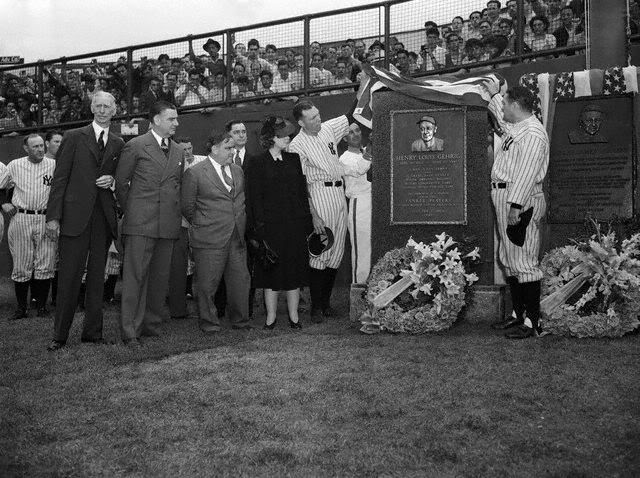 |
| Babe Ruth and Lou Gehrig's widow attend the belated unveiling of the monument at Yankee Stadium honoring Gehrig, 6 July 1941. |
July 1941
July 1, 1941: US TV Broadcasting Starts
July 2, 1941: MAUD Report
July 3, 1941: Stalin Speaks
July 4, 1941: Pogroms in Eastern Europe
July 5, 1941: Germans on Schedule
July 6, 1941: Australians Attack Damour
July 7, 1941: US Marines in Iceland
July 8, 1941: Flying Fortresses In Action
July 9, 1941: British Take Damour
July 10, 1941: Sword and Scabbard Order
July 11, 1941: Cease-fire in Syria and Lebanon
July 12, 1941: Anglo/Russian Assistance Pact
July 13, 1941: Uprising in Montenegro
July 14, 1941: Katyusha Rocket Launchers in Action
July 15, 1941: Smolensk Falls
July 16, 1941: Stalin's Son Captured
July 17, 1941: Heydrich Orders Mass Executions
July 18, 1941: Twin Pimples Raid
July 19, 1941: V for Victory
July 20, 1941: The Man Who Wouldn't Shoot
July 21, 1941: Moscow in Flames
July 22, 1941: Soviet Generals Executed
July 23, 1941: Secret Plan JB 355
July 24, 1941: Operation Sunrise
July 25, 1941: US Naval Alert
July 26, 1941: Italian E-Boat Attack on Malta
July 27, 1941: MacArthur Returns
July 28, 1941: Auschwitz Exterminations
July 29, 1941: Rescue From Crete
July 30, 1941: Raid on Petsamo and Kirkenes
July 31, 1941: Final Solution Order
2020
